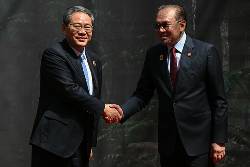KUALA LUMPUR, Malaysia (AP) — Malaysian Prime Minister Anwar Ibrahim on Monday urged Asia-Pacific leaders to choose dialogue over coercion and cooperation over confrontation, as he opened the East Asia summit at a time of sharpening rivalry between the United States and China.
The East Asia summit is a regional forum between the Association of Southeast Asian Nations and its key regional partners — Australia, China, India, Japan, New Zealand, South Korea, Russia and the United States — to discuss political, security and economic challenges.
“Today we must renew our shared purpose, reassert our objectives, promote principles of forward-looking engagement,” Anwar said in his opening remarks. “We continue to advocate for dialogue over coercion...and cooperation over confrontation. We affirm our stand on global peace and security, for multilateralism and international law.”
The summit convened after U.S. President Donald Trump left Malaysia earlier Monday for Japan, following his participation at ASEAN's weekend summit meetings. On Sunday, Trump witnessed the signing of several economic agreements with Malaysia, Thailand, and Cambodia — part of Washington’s push to strengthen trade ties and secure access to critical minerals as it seeks to reduce reliance on China.
Trump also attended a ceremony marking a formal expansion of the Cambodia–Thailand ceasefire that Washington helped broker earlier this year.
Analysts expect discussions to focus on tensions in the South China Sea, ASEAN’s response to internal crises particularly Myanmar’s prolonged conflict and cross-border scams. South Korean President Lee Jae Myung and Cambodia Prime Minister Hun Manet agreed during talks Monday to form a joint task force from November to combat transnational scams, especially those targeting South Koreans.
The U.S. delegation is expected to emphasize freedom of navigation, economic security and a transactional approach to alliances and trade, presenting Washington as a reliable partner for Indo-Pacific stability said Ilango Karuppannan, former Malaysian ambassador and senior adjunct fellow at Singapore’s S. Rajaratnam School of International Studies.
By contrast, China, represented by Premier Li Qiang, will likely underscore sovereignty, noninterference and the virtues of connectivity through projects such as the Belt and Road initiative and other regional frameworks, he said.
Their "rivalry sets the backdrop against which every other issue is discussed — from security to trade” but ASEAN is expected to maintain its neutrality, keeping the focus on regional cooperation, not on taking sides, Ilango said.
“The 20th East Asia summit will be remembered for the signing of the peace deal and U.S. trade recalibration with Southeast Asia,” he added.
Anwar in his speech again commended Trump's plan to end the Gaza conflict, but said more must be done to ensure a just and lasting political solution for the Palestinian people.
He voiced concern over the recent surge of ballistic missile launches by North Korea and called for engagement.
“Once we call for engagement in all areas from Gaza to Ukraine to Myanmar, we should not preclude engagement with (North Korea),” he said.
Anwar also said territorial tensions in the South China Sea should be resolved within ASEAN and its regional partners, with a “Code of Conduct” being negotiated to govern behavior in the disputed global sea route. He warned outside pressure could escalate tensions and urged all parties to respect international law.
On Myanmar, he said ASEAN is sticking to its 2021 Five-Point Consensus on peace and dialogue to resolve the civil war triggered by Myanmar’s 2021 military takeover. He didn't touch on Myanmar's plan for a general election, but said fighting has subdued and that engagement should continue.
U.N. Secretary-General António Guterres, in a meeting with ASEAN leaders later Monday, warned Myanmar's plans for elections in December, that critics say won't be free nor fair, could cause further exclusion and instability.
The impact of U.S. tariffs loom large over the meetings as countries seek ways to counter their effects. Canadian Prime Minister Mark Carney said Monday that Canada plans to accelerate free trade talks with ASEAN, targeting a completion next year. Canada also aims to double its non-U.S. exports in the next decade to bolster its economy, he said.
Trump last week said he was ending “all trade negotiations” with Canada in anger over a television ad opposing U.S. tariffs. While he didn't hold talks with Trump in Kuala Lumpur, Carney said Canada is prepared to resume negotiations when Washington is ready.
“We stand by the progress that has been made and we are ready when appropriate to pick that up,” he told a news conference.
Malaysia also announced the completion of a free trade pact with South Korea.
Earlier Monday, ASEAN members and five partners — China, Japan, South Korea, Australia, and New Zealand — held a leaders' summit of the Regional Economic Comprehensive Partnership, the first since they signed a free trade pact in 2020. The agreement, which covers roughly one-third of global GDP, aims to promote regional economic integration and strengthen supply chain resilience.
In a joint statement, the RCEP leaders said their partnership could bolster the region’s economic resilience in the face of current global uncertainties. They reaffirmed their commitment to multilateralism and vowed to enhance the implementation of the RCEP agreement and domestic reforms.
The RCEP is "a practical hedge against U.S. tariff shocks,” said Doris Liew, an economist specializing in Southeast Asian development. Even though their provisions are loose and not seen as strong as some other regional trade blocs, she said their partnership could help them diversify their trade baskets and reduce exposure to unilateral U.S. actions.
...


